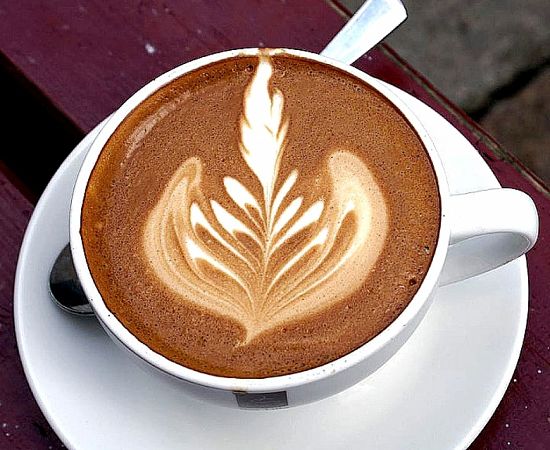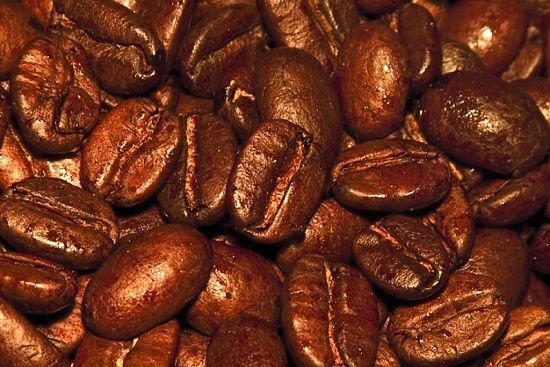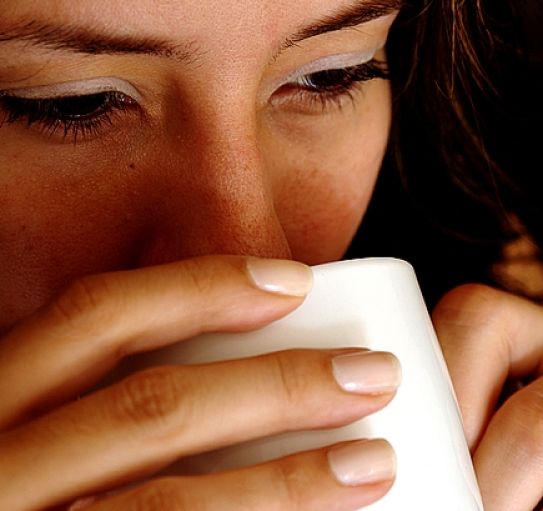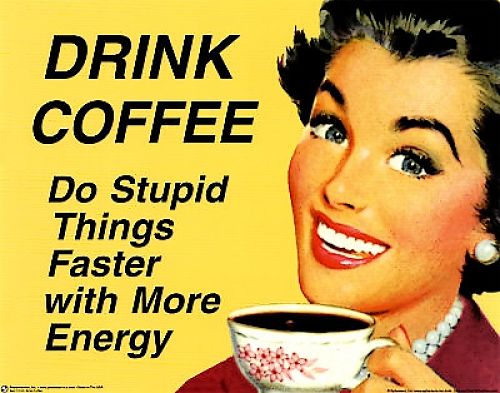Is Coffee Good For You - Best Types, Health Facts for Coffee and Benefits
Most people love their coffee but many have been put off by claims that coffee is bad for you.
However, apart from pregnant women and people with high blood pressure, there is lots of evidence that coffee in moderation is good for your health, as long as you don't overdo it.
Recent studies suggest a slightly lower coronary heart disease mortality with moderate coffee consumption.
One study of the coffee consumption of elderly people on the island of Ikaria in Greece showed a reduced heart disease risk despite the local, strong Greek coffee having one of the highest caffeine levels of any type of coffee.
Brewed coffee has almost double the caffeine content of percolated coffee (135 mg per 8 oz cup of coffee compared with 74 mg).
Most of the subjects drank moderate to high amounts of brewed Greek coffee (about 400 ml per day; 4 or more cups per day).
This article reviews the known health benefits of coffee.

Studies have shown that coffee consumption (in moderation) has been linked with increasing the diversity and balanced composition of your gut bacteria. A healthy gut helps keep you healthy! Your gut microbial system plays many vital roles in the human body. It helps support important bodily functions, including the digestive system, immune system and nervous system.
The beneficial bacteria that live in our intestines typically consume prebiotics, which are parts of fiber in fruits and vegetables that we cannot digest. The gut bacteria process these prebiotics and produce polyphenols and antioxidants that we can then digest. Polyphenols are found in a wide variety of plant-based foods.
The important point is that coffee beans contain an abundance of prebiotics. Specifically coffee is rich in polyphenols which have been linked to many health benefits. Polyphenols are also found in foods such as cacao, tea, red wine, spices berries and vegetables. Coffee beans also contain soluble fibre which helps to promote regularity and healthy stool.



|
Serving 1 cup brewed black coffee (8 fl oz) (237g)
|
Amount
|
% Recommended daily allowance
|
|---|---|---|
|
Caffeine
|
94.8 mg
|
|
|
Calories
|
2.4
|
0.5%
|
|
Protein
|
0.3 g
|
1%
|
|
Vitamin K
|
0.2 mcg
|
0%
|
|
Thiamin
|
0.1 mg
|
2%
|
|
Riboflavin
|
0.2 mg
|
11%
|
|
Niacin
|
0.5 mg
|
2%
|
|
Folate
|
4.7 mcg
|
1%
|
|
Pantothenic Acid
|
0.6 mg
|
6%
|
|
Choline
|
6.2 mg
|
0%
|
|
Calcium
|
4.7 mg
|
0%
|
|
Magnesium
|
7.1 mg
|
2%
|
|
Phosphorus
|
7.1 mg
|
1%
|
|
Potassium
|
116 mg
|
3%
|
|
Sodium
|
4.7 mg
|
0%
|
|
Manganese
|
0.1 mg
|
3%
|
Health Benefits of Coffee
It appears that it not just the caffeine in coffee, but the other ingredients in coffee such as antioxidants, vitamins and minerals that are beneficial.
Many of the nutrients in the green coffee beans survive the roasting and brewing and others are created by the process or making a coffee.
Some of the nutrients in a brewed cup of coffee are shown in the table opposite.
Antioxidants in Coffee
Coffee is a surprisingly rich source of antioxidants. Coffee drinks contain a range of polyphenols such as hydroxycinnamic acids, flavan-3-ols (monomers and procyanidins), tannins, anthocyanidins and flavonols. These compounds have antioxidative propreties that help reduce damage to cells via oxidation. One unique compound with anticarcinogenic effects is methylpyridinium, that is not found in green coffee beans but is synthesised when the beans are roasted. The espresso method of making coffee produces coffee with higher antioxidant activities than other brewing methods.
Coffee Consumption During Pregnancy
Reduced coffee consumption and caffeine intake from other sources is recommended for pregnant women and for other people who have trouble controlling their blood sugar or blood pressure. Caffeine ingested by pregnant women is known to get through the placenta and reaches the baby. It is also known that the fetus is very sensitive to caffeine and has trouble processing it. It has been suggested that pregnant women should not drink more than one cup a day and 200 mg of caffeine.
Coffee Consumption and Blood Pressure
Caffeine can cause short, but dramatic rises in your blood pressure, even if for people with normal average blood pressure.
Research studies have shown that increases of 4-13 mm Hg
diastolic and 3-15 mm Hg systolic typically occur within 30 minutes of drinking coffee.
Some people are a lot more susceptible than others. There is also evidence that the effect of caffeine on the body diminishes with high use. Doctors and patients should be aware of this as the effect of caffeine on heart rate and blood pressure may remain for 4 hours or longer after drinking the coffee.
In the longer term, the average increase in blood pressure throughout the day for moderate to heavy coffee drinkers is probably about 2-5 mm Hg systolic and 4-6 mm Hg dystolic. People with high blood pressure may be more sensitive to the impact of caffeine on blood pressure. However the body of heavy caffeine consumption gets used to it and the tolerance that develops tends to reduce the acute effects of caffeine on blood pressure. https://www.ncbi.nlm.nih.gov/pubmed/18094346?dopt=Abstract
People with high blood pressure and the risks of stroke should check the effects of caffeine by measuring their blood pressure before and about 30 minutes after drinking a cup of coffee. You could also drink another caffeinated beverage or take the caffeine in a pill. If your blood pressure increases by 5 - 10 points, you may be more sensitive to the effects of caffeine.
The caffeine induced changes in blood pressure may push a person over the threshold for the health blood pressure categories shown below.
People concerned how caffeine may be affecting their blood pressure, should consider limiting total caffeine consumption to about 150-200 milligrams a day (about two cups of 12-ounces each). Keep in mind that there are many other sources of caffeine such as chocolate, tea and caffeinated beverage such as cola and sports drinks. Many activities such as exercise, running, fast walking, weightlifting or hard physical labor naturally increase your blood pressure.
Blood Pressure Health Categories for Healthy Adults over 18 years
|
Blood Pressure Category
|
Systolic Pressure (Top Number) - mm Hg
|
Diastolic Pressure (Bottom Number) - mm Hg
|
|
|---|---|---|---|
|
Normal
|
Less than 120
|
AND
|
Less than 80
|
|
Prehypertension
|
120 to 139
|
OR
|
80 to 89
|
|
High blood pressure - Stage 1
|
140 to 159
|
OR
|
90 to 99
|
|
High blood pressure - Stage 2
|
160 or higher
|
OR
|
100 or higher
|
|
Note: Blood pressure varies with activity and when you are excited, nervous, or active. Best measured just after you wake up.
|
Coffee and Overall Mortality
A review of coffee consumption and overall mortality for a total of 130,000 subjects from two major studies found no correlation between amount of coffee consumed and increase in mortality risk.This applied to death caused by cancer, or cardiovascular disease or any other cause. Even people who consumed as much as 6 cups of coffee every day showed no higher risk of death. This confirmed other research reviews that found coffee does not appear to have any serious detrimental effects on health.Some studies have suggested that it may be beneficial. Research published in the New England Journal of Medicine found that drinking 2-3 cups a day or more were 10-15% percent less likely to die over a 13 year period. The researchers were quick to point out that their study only showed a correlation, not cause and effect.
Coffee and Depression
A large study involving 50,000 women age from 30 - 55 years found that women who drank about 2 to 3 cups of coffee per day were about 15% less likely to develop depression. Drinking more coffee, (4 cups a day) lowered the depression risk by 20%. Interestingly, women who drank tea, decaf coffee, soft drinks and who ate chocolate that gave them a lower caffeine intake did not show the same level of protection against depression. Previous research studies linked higher caffeine consumption to lower risks of depression and suicide in men as well.
Coffee and Caffeine Can Improve Mental Functioning
Various studies have shown that people who drink coffee perform better on various mental performance and agility tests. This particularly applied to older people. The more coffee consumed the better outcome. Another study found that women older than 80 years showed better outcomes for cognitive tests if they drank coffee regularly during their lifetimes. This may be due to the stimulant effect of caffeine which unblocks the inhibitory effects of Adenosine, increases the rate of neuronal firing in the brain. Caffeine also stimulates the release neurotransmitters like norepinephrine and dopamine. Caffeine has also been shown to improve memory, mood, vigilance, reaction time and general cognitive function of the brain.
Caffeine Improves Physical Performance During Exercise
Major review studies have shown that caffeine increases exercise performance by about 10%.
This particularly applies for team sports and gym workouts. The dangers of too much caffeine and the risks of high-caffeine
energy drinks has also been well documented.
Additionally,
coffee appears to be good for the liver and may help lower the risk of cancer.
What Types of Coffee are Best and How Does Caffeine Yield Vary
The amount of caffeine in a serving of coffee obviously depends on the size of the cup. But it also depends on the darkness of the roast, the type of coffee bean, how finely the coffee is ground and the brewing method used.
It is generally suggested that people do not drink more than 400 mg a day of caffeine, with 200 mg a day suggested for pregnant women.
The table below summarizes the caffeine content of chocolate, coffee, tea and other beverages.
So to get 200 mg of caffeine requires:
- one bar of plain chocolate and one mug of filter coffee
- two mugs of tea and one can of cola
- one mug of instant coffee and one can of energy drink
To get 400 mg of caffeine requires:
- two bars of plain chocolate and two mug of filter coffee
- four mugs of tea and two cans of cola
- two mugs of instant coffee and two cans of energy drink
Caffeine Content of Various Types of Coffee,Tea, other Beverages and Chocolate
|
Beverage
|
Caffeine
|
|---|---|
|
Coffee
|
######
|
|
1 mug of instant coffee
|
100 mg
|
|
1 mug of filter coffee
|
140 mg
|
|
Brewed (6 oz)
|
100 mg
|
|
Instant (1 rounded tsp)
|
57 mg
|
|
Brewed decaffeinated (6 oz cup)
|
3 mg
|
|
Instant decaffeinated (1 rounded tsp)
|
2 mg
|
|
Cappuccino (4 oz)
|
100 mg
|
|
Espresso (2 oz)
|
100 mg
|
|
Latte (single)
|
50 mg
|
|
Mocha (single)
|
55 mg
|
|
Chocolate
|
#####
|
|
50g bar of plain chocolate
|
50 mg
|
|
50g bar of milk chocolate
|
25 mg
|
|
Cocoa beverage (6 oz)
|
4 mg
|
|
Chocolate flavored syrup (2 tbs)
|
5 mg
|
|
Chocolate milk (8 oz)
|
8 mg
|
|
Milk chocolate (1 oz)
|
7 mg
|
|
Semi-sweet chocolate (1 oz)
|
18 mg
|
|
Unsweetened chocolate (1 oz)
|
25 mg
|
|
Other Beverages (12-oz servings)
|
#####
|
|
Coca-Cola, Diet Coke
|
46 mg
|
|
Dr. Pepper (regular & sugar-free)
|
40 mg
|
|
Mello Yello
|
52 mg
|
|
Mountain Dew
|
54 mg
|
|
Pepsi-Cola, Diet Pepsi
|
38 mg
|
|
Red Bull (8.2 oz)
|
80 mg
|
|
5-Hour Energy
|
138 mg
|
|
Monster Energy
|
160 mg
|
|
Tea (5-oz cup)
|
#####
|
|
Brewed, green or black, U.S. brands (3 minutes)
|
40 mg
|
|
Brewed, imported brands
|
60 mg
|
|
Instant (1 tsp)
|
30 mg
|
|
Iced (8 oz)
|
25 mg
|
|
Decaffeinated
|
5 mg
|